 Petzlover
Petzlover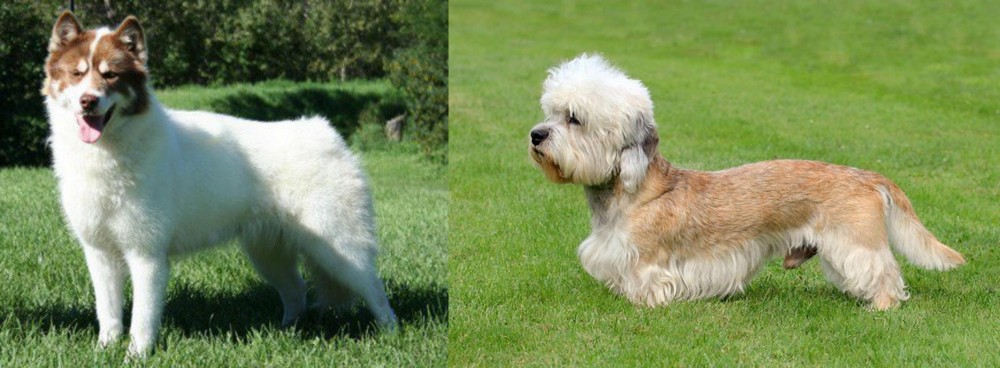 Canadian Eskimo Dog is originated from Canada but Dandie Dinmont Terrier is originated from United Kingdom. Canadian Eskimo Dog may grow 45 cm / 18 inches higher than Dandie Dinmont Terrier. Canadian Eskimo Dog may weigh 29 kg / 64 pounds more than Dandie Dinmont Terrier. Both Canadian Eskimo Dog and Dandie Dinmont Terrier has same life span. Both Canadian Eskimo Dog and Dandie Dinmont Terrier has almost same litter size. Both Canadian Eskimo Dog and Dandie Dinmont Terrier requires Moderate Maintenance.
Canadian Eskimo Dog is originated from Canada but Dandie Dinmont Terrier is originated from United Kingdom. Canadian Eskimo Dog may grow 45 cm / 18 inches higher than Dandie Dinmont Terrier. Canadian Eskimo Dog may weigh 29 kg / 64 pounds more than Dandie Dinmont Terrier. Both Canadian Eskimo Dog and Dandie Dinmont Terrier has same life span. Both Canadian Eskimo Dog and Dandie Dinmont Terrier has almost same litter size. Both Canadian Eskimo Dog and Dandie Dinmont Terrier requires Moderate Maintenance.
 The Canadian Eskimo Dog dates way back to more than 4,000 years ago. This Arctic breed of dog was developed to pull sleds, and wasn’t considered as a pet but as a working dog – an important means to an end – a tool for use.
The Canadian Eskimo Dog dates way back to more than 4,000 years ago. This Arctic breed of dog was developed to pull sleds, and wasn’t considered as a pet but as a working dog – an important means to an end – a tool for use.
By the 1960s the dog breed had declined to such an extent that they were removed from UKC and AKC registries. It is believed that the breed would have in all likelihood become extinct if it weren’t for the efforts of Brian Ladoon, William Carpenter and John McGrath who formed the Eskimo Dog Research Foundation in 1972.
After breeding for 30 years, the dog has the biggest genetic stock colony of Canadian Eskimo Dogs and in May 2000, Nunavut, a Canadian territory, adopted the dog as the animal symbol for this region.
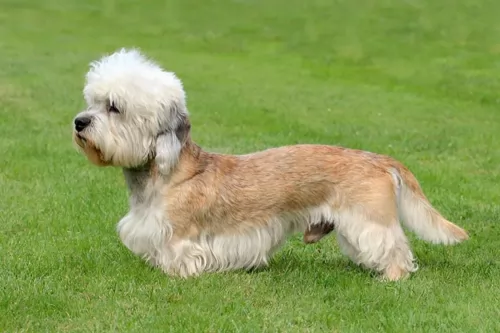 The rough coated Dandie Dinmont Terrier originates from Scotland. They were used centuries ago for hunting otters and badgers.
The rough coated Dandie Dinmont Terrier originates from Scotland. They were used centuries ago for hunting otters and badgers.
There are theories that exist that the dog is a cross between Scottish- and Skye Terriers while others believe there must be some Dachshund in the mix because of the long body of the Dandie Dinmont Terrier.
The Dandie Dinmont Terrier was first recorded as a distinct breed in the late 1600s. The British Dandie Dinmont Terrier Club was formed in 1875 while the American Kennel Club recognized the Dandie in 1886.
 The Canadian Eskimo Dog is a well-built, medium- to large sized dog looking much like a husky. The male Eskimo dog is somewhat bigger than the female, standing 58 – 70cm at the shoulder and weighing 30 - 40kg.
The Canadian Eskimo Dog is a well-built, medium- to large sized dog looking much like a husky. The male Eskimo dog is somewhat bigger than the female, standing 58 – 70cm at the shoulder and weighing 30 - 40kg.
The male often has some thick fur around the neck, giving him the appearance of looking larger than he actually is. He is slightly larger than the female. Other people say he has a similar appearance to a wolf.
He has a thick double coat which can be white, gray, fawn or even black and white. He has short, erect ears, dark brown eyes and a bushy, feathered tail which curls over the back. Sometimes you find blue eyes with the Canadian Eskimo Dog, and its only when you want to show him, that this isn’t acceptable.
The Canadian Eskimo Dog's temperament is hard working, tough, brave, alert and intelligent. When he is trained and socialized, which will be important for this breed, he becomes gentle and loving, forming a strong bond with his owner. He’ll also get along well with children in the home as well as other pets.
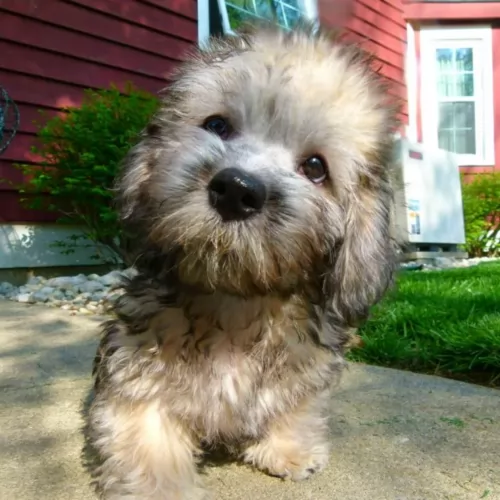 The Dandie Dinmont Terrier is a small dog who stands between 20 – 28cm at the withers and weighs between 8 and 11kg. He is recognizable by his fluffy head of hair.
The Dandie Dinmont Terrier is a small dog who stands between 20 – 28cm at the withers and weighs between 8 and 11kg. He is recognizable by his fluffy head of hair.
He actually has quite a unique look with his long body and slightly over-sized head. He has floppy ears and a long tail. His coat is quite unusual too in that it can be silky and long around the face, legs and belly, while the topcoat is fairly shortish and crisp. His coat color is fawn to brown or reddish. He isn’t a heavy shedder.
Known also as the Dandie, Charlie’s Hope Terrier, the Mustard and Pepper Terrier, the Dandie Dinmont makes an excellent family pet with his calm demeanor, being somewhat reserved around strangers.
He is an alert, intelligent little dog and will warn you of strangers coming into your space. He therefore makes a good watchdog. He is loving and loyal to his human family and will readily fit into life in the city or in the countryside.
They are good with children and pets but with his independent streak, he will require training and socialization if you want him to behave and be obedient.
 The Canadian Eskimo Dog is a dog which is responsive to training. With training and socialization, as a highly intelligent, strong-will dog he will need to be supervised by a firm, authoritative figure.
The Canadian Eskimo Dog is a dog which is responsive to training. With training and socialization, as a highly intelligent, strong-will dog he will need to be supervised by a firm, authoritative figure.
He makes such an awesome pet when properly trained, and if you’re a responsible dog owner who knows how to care for- and exercise your pet appropriately, you’ll be rewarded by having a strong, loving companion at your side.
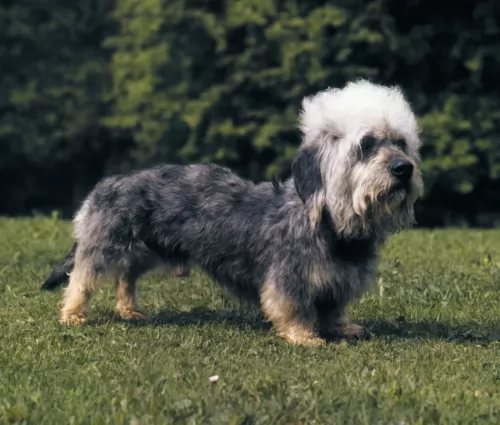 Your Dandie Dinmont is capable of being a wonderful companion. He loves spending time with his human family and is affectionate and loyal.
Your Dandie Dinmont is capable of being a wonderful companion. He loves spending time with his human family and is affectionate and loyal.
The small Dandie is able to fit into life in the city or country, just so long as he has his human family with him. Because he comes from Terrier dogs, he is no push-over though and he has an independent streak which will benefit from training and socialization.
Make sure you give this small dog of yours plenty of love and good care and you will find that you have a loyal, devoted friend in him.
 The Canadian Eskimo Dog is a generally healthy breed who has a life expectancy of between 10 and 15 years when he is lovingly cared for and provided with a top quality diet. Ensure that he has a top quality diet with plenty of raw meat geared towards his age and energy levels.
The Canadian Eskimo Dog is a generally healthy breed who has a life expectancy of between 10 and 15 years when he is lovingly cared for and provided with a top quality diet. Ensure that he has a top quality diet with plenty of raw meat geared towards his age and energy levels.
The Canadian Eskimo Dog suffers from common health issues that most dogs are at risk for, and typically this will include hip dysplasia and eye disease. If your dog develops a disease such as hip dysplasia, speak to your vet immediately.
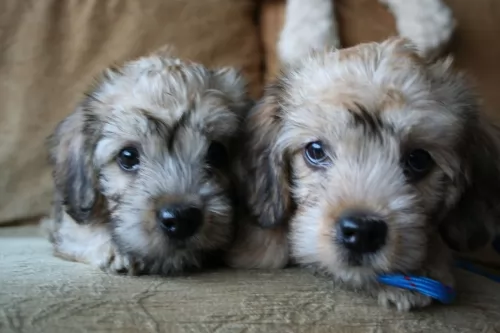 Your pet Dandie Dinmont is a robust little dog who, with good care, can live to be anything between 12 to 15 years of age.
Your pet Dandie Dinmont is a robust little dog who, with good care, can live to be anything between 12 to 15 years of age.
With every dog breed there will be health concerns, and these can include illnesses such as epilepsy as well as hypochondroplasia. All dogs have the potential to fall prey to health problems, and getting your pet from a reputable breeder can help to ensure you eliminate some of these diseases.
This small dog has a long body which means he can be affected by spinal problems. Genetics and body shape play a large role. Intervertebral disc disease is a condition where the cushioning discs between the vertebrae of the spinal column herniate into the spinal cord space. The discs press on the nerves and pain and paralysis can follow.
 The Canadian Eskimo Dog has always been a working dog, used to being driven hard to perform, and to this day he likes to work hard and have his day filled with activities.
The Canadian Eskimo Dog has always been a working dog, used to being driven hard to perform, and to this day he likes to work hard and have his day filled with activities.
His exercise requirements are high and this is one breed that you’re going to have to exercise regularly – long walks, running on a leash as you cycle, ball games, swimming, hiking. It is why the dog is best suited for life in the country as opposed to small properties in the city. If exercise seems like a lot of hard work for you, don’t buy such a breed as it will be cruel and irresponsible to leave him day after day in your back yard. He becomes bored, frustrated, unhappy and destructive.
The dog is an average shedder and his coat is short and dense. There’s not a whole lot of maintenance to worry about with this good-looking dog and he will basically require having a good brush twice a week.
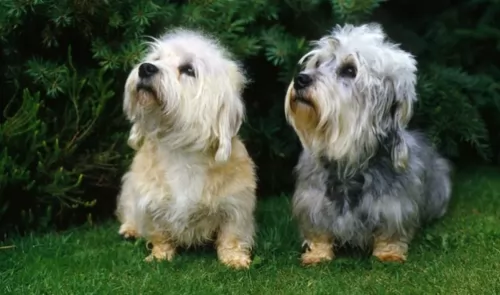 The Dandie doesn’t require as much exercise as some other dog breeds but you want to make sure he goes with you on your walks, or you play ball with him in the garden. You don’t want to see a small dog like this becoming obese as it can herald in a host of health problems.
The Dandie doesn’t require as much exercise as some other dog breeds but you want to make sure he goes with you on your walks, or you play ball with him in the garden. You don’t want to see a small dog like this becoming obese as it can herald in a host of health problems.
The Dandie Dinmont Terrier doesn’t shed a hang of a lot but still, you will need to brush him twice a week to get rid of those loose hairs. Also, the coat will require stripping twice a year. Some dog owners who prefer a low maintenance breed might not like knowing this, but it is a necessary part of his grooming. There are some dog owners who cut the hair rather, but then the texture of the coat will change. This is only important to know if you want to show your Dandie. Other Dandie owners take their pets to a professional groomer for clipping.
Because the Dandie has floppy ears and a lot of hair around the face and ears, you will need to check his ears for dirt and wax build-up as these can cause an ear infection. If you’re nervous to be going inside your dog’s ears, the vet or the dog groomer can show you how.
Also, little dogs like this are prone to tooth decay, and you will need to brush his teeth 2 or 3 times a week. This is because plaque and tartar buildup can cause mouth infections which contribute to other diseases within the body.